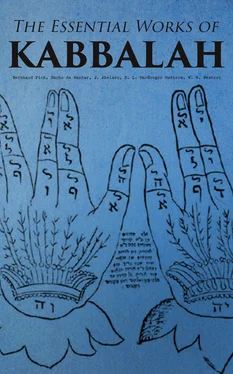Rabbi Eleazar and Rabbi Abba knelt and prostrated themselves before the stranger, and then--but where was he? He had suddenly disappeared. They looked around amazed, but he was not to be seen. They sat down and pondered, bewildered and speechless. At length Rabbi Abba spake, and said:
"True is it that whenever students of esoteric truths travel together, discoursing amongst themselves on the mysteries of the secret doctrine, then are they visited by spiritual masters and teachers from on high. This stranger was indeed none other than Rabbi Hammenuna, the Aged, who has taught us truths which have never been divulged and revealed to anyone before, and leaving us before we were able to recognize him."
Then rose they up to mount their asses, but were unable to do so. Again they tried, with no better success. Filled with a feeling of trepidation, they fled away and left their asses behind, and to this day that place is known and called Assfield .
Table of Contents
RABBI ELEAZAR spake and said: "How great is thy goodness which thou hast laid up for them that fear Thee" (Ps. xxxi. 19). How exceedingly great the celestial happiness which the Holy One has prepared for those who are pure in heart and mind and delight in the study of the divine law, when they ascend into the higher and diviner life. The scripture does not only say thy goodness, but the great abundance of thy goodness. What do these words comprehend? It will be one of the great enjoyments of those who attain to the higher life, to live in the presence of the Eternal One who is known to them as "Abundant Goodness" and who in scripture is referred to as "the great good to the house of Israel, or children of light." Again, "How great is thy goodness," words wherein is contained the mystery of Hochma (Wisdom) which includes all mysteries and therefore is designated or called Mah (how.) "Thy goodness" is the light created on the first day. "Which thou hast laid up for them that fear thee" signifies the garden of Eden of which it is written: "The place, O Lord, which thou hast made for them to dwell in" (Ex. xv. 17). "Before the sons of Men," viz., the soul:; of the just who, on their ascension into Paradise, became clothed with bright ethereal raiment and in their forms resemble those they bore on the earth plane. After abiding there a short space of time, they mount up to the celestial college in the higher Eden, where, after bathing in perfumed rivers, they come forth at times, appearing to man, on whose behalf they perform miracles like the angels from on high and similar to what we have ourselves just experienced. We have seen the light of the sacred lamp, but alas! that we have not learned and acquired more of the secret doctrine of Wisdom.
Then spake Rabbi Abba. It is written: "And Manoah said to his wife, 'We shall surely die for we have seen God'" (Judges xiii. 22). Although Manoah knew not who had spoken to him, yet he imagined it was the divine Being of whom it is affirmed "No man can see my face and live." We ourselves have been blessed with the celestial light that has been with us on our way, and whom the Holy One has sent to us in order to make known and reveal to us secret wisdom. Happy are we!
Then went they on their way and arrived at a hillside as the sun was about to set. The leaves of the trees in a neighboring grove stirred by a gentle breeze began in sweet cadences to hymn their praises to the Creator and heard by the travellers wending their way, a voice cried: "Children of the great Divine who go down and mingle with mortals on the earth plane, and who reflect the light of your learning in the celestial college, assemble and gather yourselves together in your usual places for instruction in the secret doctrine." Then another voice exclaimed: "Ye great and honored teachers, behold, the Master sits on his throne!" Then another voice, in great and mighty tones, cried aloud: "The voice of the Lord breaketh the cedars" (Ps. xxix. 5). Rabbi Eleazar and Rabbi Abba at once prostrated themselves with their faces on the earth and trembled greatly. At last, rising, they fled hastily away and stayed not to listen longer, but proceeded on their way.
On arriving at the house of Rabbi Jose, son of Rabbi Simeon, son of Leconga, they beheld Rabbi Simeon ben Jochai there, and were exceeding glad. Said Rabbi Simeon: I know your journey has been a wonderful and marvellous one. We were sleeping when you went forth and we saw with you Benaiah the son of Jehoida and who had brought two crowns from the Aged One wherewith to bedeck you. Truly the Holy One was with you. Furthermore, if I had not seen this in a vision, I should have divined from your looks what has happened unto you. Said7b Rabbi Abba: What thou sagest is true, and the words of a sage are of more worth than those of a prophet. Rabbi Eleazar then recounted to his father all that had happened to them. Rabbi Simeon trembled and said: "Oh, Lord, I have heard thy speech and was afraid" (Habac. iii. 1). These words were uttered by the prophet Habacuc. After dying he was resuscitated and brought back to life by Elisha, the prophet and seer. Wherefore was he called Habacuc? Because of the words of Elisha to his mother: "About this season, according to the time of life, thou shalt embrace a son" (II. Kings iv. 16). In Hebrew the word embrace is expressed by the word habac . The prophet Habacuc was the son of the Shunamite woman and was so named because he was once embraced by his mother and again by Elisha as the scripture relates. "And he put his mouth upon his mouth" (II. Kings iv. 34). In an ancient book written by King Solomon, I have read that the seventy-two sacred divine names of the Holy One imprinted on the body of every mortal born into the world, had faded and become obliterated from the form of the Shumanite's son when he died. After Elisha the prophet had embraced him, these names containing two hundred and sixty letters reappeared, hence his name Habacuc, the numerical value of the letters composing it, being equal to 260. This is why Habacuc said: "I have heard thy speech and was afraid," (Hab. 3:2) that is, what I must experience or pass through in the world and was afraid. Oh, Lord! grant that thy work which time hast performed through me in my two lives may endure.
Pausing a moment, Rabbi Simeon exclaimed: After what I have heard from you I also am afraid before the Holy One. Then raising his hands on high he cried: How great is Hammenuna the aged, the renowned teacher of the secret doctrine! Blessed and happy are ye who have seen him face, to face, a favor I have never enjoyed. Prostrating himself upon the earth, Rabbi Simeon beheld in a vision Rabbi Hammenuna the aged, on his course and hastening to light up the temple of King Messiah. Observing Rabbi Simeon, he cried: "Thou shalt be associated and take thy place with the great teachers of the secret doctrine who ever stands in the presence of the Holy One." From that day Rabbi Simeon called Rabbi Eleazar his son and Rabbi Abba by the name of Peniel as we read of Jacob: "He called the name of the place Peniel, for I have seen Alhim face to face" (Gen. xxxii. 30).
Exposition Of Bible Mysteries
Table of Contents
"In the beginning," Rabbi Hiya spake and said: "The beginning of wisdom is the fear of Jehovah, a good understanding I have all they that do his commandments, his praise endureth forever" (Ps. cxi. 10). The beginning of wisdom has reference to the great object of wisdom, viz., to raise and elevate us into the higher and diviner life, as it is said: "Open to me the gates of righteousness" (Ps. cxviii. 19). This is the gate or way of the Lord through which everyone must pass in order to attain lento this life and live in the presence of the heavenly king. Ere this, however, there are several other gates on the upward course which must be passed through, each with their bolts and bars that have to be unloosed, and the last of which is that called "the fear of the Lord." It is the one only gate of access. There are in scripture two beginnings (bereshith) mentioned, and are united into one, viz., "the fear of the Lord" and "the beginning of Wisdom," both one and the same, and never found disjoined from each other. As it is written: "That men may know that thy name is Jehovah only." (Ps. lxxxiii. 18). Why is the first gate called the fear of the Lord? Because it is a tree of good or evil. When a man lives uprightly, it is a tree of good to him; if unjustly, a tree of evil. It is the gate or portal through which all blessing, spiritual or temporal, comes. The words: "A good understanding," refer to those gates which, as aforesaid, are one and the same.
Читать дальше












